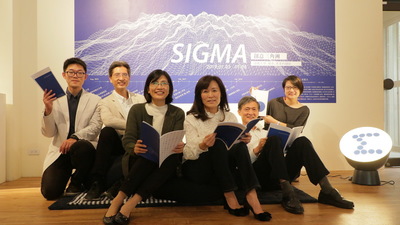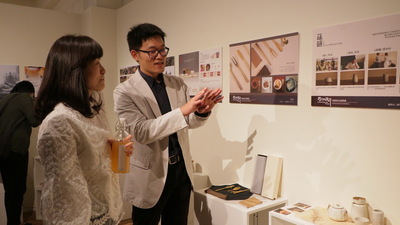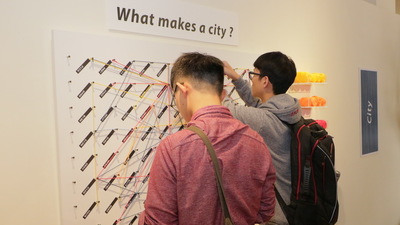NCKU’s LDT School Project Yields Abundant Achievements and Interacts with the Public off Campus



After three years and a half, NCKU’s LDT School (Liberal Arts/Design/Technology) project has come to an end. To display the achievements and joy of the 51 courses offered during the project’s 1279 days, an exhibition was held at an off-campus venue, the Asir Art Museum. Unlike most exhibitions, the teachers and students behind the exhibition presented city memories and information to visitors via fun interactions with them so that they would build more ties with the city.
The achievements of the project can be divided into three major categories: university, city, and industry. One wall displayed the words “What makes a city?” and invited visitors to choose what they thought to be key terms using yarn, such as “everlasting”, “convenient life”, and “diverse culture”. This also revealed what citizens cared most about. The teachers and students also designed questions for visitors to answer by signs that could be flipped, and in some cases, they provided darts that visitors could use to choose and answer questions with. Successful challengers could win tote bags, specially-made drinks, or products made personally by the students by hand. It made for a lot of fun at the exhibition.
One special exhibit contained the achievements of the Archaeology and Design course, where students contemplated the meaning of cultural heritage from the perspective of archaeology. With Tainan City as the venue of field study, they observed the cultural morphology of the city as it formed. Some students used the colors of beef soups from different eateries to design the packaging of black tea bags and included introductions to each unique soup base, which showed much ingenuity. Taking inspiration from the traditional Taoist custom of drinking charm ash water, other students made "blessed candy” to preserve the imagery of burning charms and enable believers to be similarly blessed and protected. Still other students designed tea sets based on the four most important stages of life in traditions: birth, coming of age, marriage, and old age.
Project director and NCKU president Jenny Huey-Jen Su visited the exhibition with excitement and gratitude. She stated that these achievements served as crucial steps in humanities education for NCKU and its College of Liberal Arts and even for Tainan and Taiwan. Seeing so many students gain a better capacity to imagine and narrate, she believes that there are higher, further, and more different starting points out there. “The LDT School is not the end but the start of a new challenge and new future brands.”
Professor Yuhneu Chen, dean of the College of Liberal Arts and one of the co-directors of the project, indicated that these 51 courses made a breakthrough in intercollegiate relations. A total of 62 teachers took part in the project. “Co-creating with teachers and students in other fields, inviting citizens to participate in our activities, and sharing our resources are extremely important things.” She is pleased to see that the works of their students can connect to other venues off campus, enabling the classroom to really extend to Tainan. Every little feedback from the city has become infinite teaching materials.
Dean Tay-Sheng Jeng of the College of Planning and Design, the other co-director of the project, pointed out many good experiences in the past three years. When the College of Liberal Arts made the step to collaborate with other colleges, the new value that they created together was somethingthat could not be seen anywhere else. “It was very impressive in thickness, depth, and breadth.”
Yu-Ting Weng, a sophomore majoring in Taiwanese literature, took the elective course Sweet Tainan: The Memories and Representations of Sugar Industry in Tainan. She elatedly shared her experiences of brainstorming with students in different fields and being creative with product designs. “You could even really work with businesses and create value. It was so fun!” They designed new eye-catching labels for a clam essence product and used word play to create interesting slogans.
NCKU’s LDT School project was funded by the Ministry of Education’s 2015 Project of Cultivation of Humanities and Social Sciences Competence in Interdisciplinary Field Application, which ran from August of 2015 to January of 2019. During this project, an experiment on humanities and innovation was jointly carried out by the various colleges of NCKU. The 51 courses covered a variety of content, including composing and performing traditional Chinese opera, hand-making original books with illustrations, Matsu work camps, documentary work camps, and cultural design apps.
Aside from the courses, they also renovated the NCKU Museum of History, creating a venue that can be fully used by students and teachers and fit better in campus life. Their hope is to build connections between Tainan and the international community, examine how the humanities in Tainan developed from the perspectives of culture, geography, history, cities, architecture, and historical sites, and promote world heritage concepts and education.




